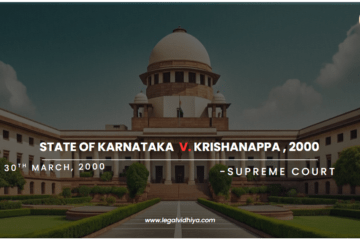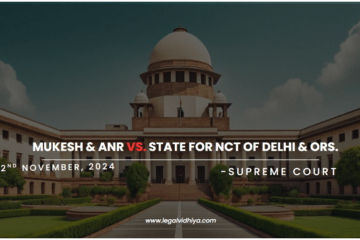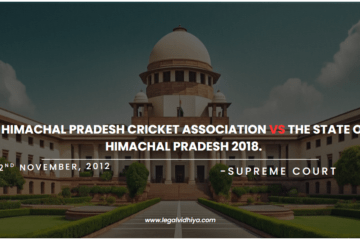
| Citation | AIR 1993 SC 1126 |
| Date | 1 December 1992 |
| Court | The Supreme Court Of India |
| Case type | Criminal |
| Bench | K Singh, K Ramaswamy |
| Appellant | State Of Karnataka |
| Respondent | Appa Balu Ingale & Ors. |
| Referred | Article 17 Constitution Of India, The Protection Of Civil Rights Act 1955. |
Facts-
The practice of untouchability is rooted in the caste system and the hierarchical structure that defines an individuals identity. Scholars and social activists have made efforts to address this issue, which arises from a sense of superiority ingrained in the minds of those belonging to castes. Consequently discriminatory practices and oppressive actions are inflicted upon marginalized communities exacerbating their feelings of inferiority and mental hardships. The specific acts that enforce this disablement vary from one case to another.
The incident under consideration revolves around a situation where members of the Harijan community were threatened when attempting to access water from a borewell. According to witnesses presented by the prosecution this borewell was being installed 15 feet away from the Harijan colony. During the drilling process on that day water sprayed from the well around 9;30 PM. Both Hindu and Harijan individuals were present at the location. After young Hindu girls concluded a ceremony (pooja) Hindus drew water from the well for temple rituals. The complainant and prosecution witnesses also intended to collect water using pots from the well.
However at that moment they were requested by the people not to fetch water from the well. The explanation provided to them was based on their belonging to the Harijan community. Having a well available for their water needs. Furthermore the Harijans encountered obstacles from the individuals involved Respondent 1 who used a gun as a threat. Fearing consequences the complainants refrained from using the well for water purposes.
This case has gone through stages. Initially in the trial court all accused individuals were found guilty. Received sentences of imprisonment along with fines. On appeal to the Additional Sessions Judge, two of the accused were acquitted. The remaining three convicted individuals filed a revision petition with the High Court. Allowing this petition a Single Judge in the High Court discredited the testimony of prosecution witnesses, on grounds that their words were not presented verbatim in their statements. As a result the remaining three accused were also acquitted.
Issues Involved-
Currently in this stage of the case, where an appeal has been made to the Supreme Court against the decision of the High Court the main matter being discussed revolves around reviewing the evidence presented by the prosecution in a case related to an offense mentioned in legislation.
In this situation the defendants have been accused of committing offenses outlined in Sections 4 and 7 of the Protection of Civil Rights Act, 1955. These sections specify the penalties for engaging in actions that impose disadvantages like obstructing access to resources and attempting to hinder individuals from exercising their rights.
Arguments-
An appeal was filed against the decision made by the High Court using its ” jurisdiction,” which overturned the verdict of the defendant based on the evidence presented by the prosecution. In this case the appellant raised arguments against this acquittal primarily focusing on inconsistencies in the evidence. The witness did not provide a word for word account of what was said leading to the defendant’s acquittal.
Judgement-
1. It is evident, beyond any doubt, that the guilt of the accused has been proven. However the High Court went beyond its jurisdiction by interfering with the findings of courts and reevaluating the evidence presented by prosecution witnesses.
2. The enactment of the Protection of Civil Rights Act, in 1955 aimed to eradicate untouchability practices and impose penalties on any actions that enforce discrimination.
3. In legislation concerning disabilities it is not necessary to establish mens rea as a determining factor.
4. The judicial process has the potential to facilitate transformation, which’s why judicial review should align with present day necessities.
International legal instruments focus on promoting measures to safeguard basic human rights. Discrimination manifests in behaviors and practices that differ from one region and country to another. Despite these differences nations share objectives in protecting rights and eradicating discrimination.This case highlights the importance of the process in facilitating change and transformation. The judges thoroughly examined the context of the issue at hand. They also emphasized the need for interpretation rules and newer approaches, such as the approach. These broader interpretations provide judges with discretion when determining the purpose and essence of legislation and implementing social policies.Additionally this case reaffirms that criminal laws aim to punish behaviors and discriminatory acts within society. By imposing penalties it serves as a deterrent against committing crimes. It emphasizes how judicial activism plays a role in driving transformation within diverse nations like ours.However one limitation of this case is its emphasis on untouchabilities practice and theoretical aspects without providing guidelines, for abolishing such practices in today’s era.The text examines all the materials explored during the independence period that are relevant, to the issue of untouchability. However simply restating the problem of defining this concept does not offer any insights that have yet to be discussed. Furthermore it neglects to address the new socio factors that should be taken into account when granting status and protection to a particular community. Of summarizing empirical studies and historical sources on untouchability it would have been more beneficial to provide constructive opinions on what steps should be taken in the future.Considering that some individuals have recently tried to exploit these provisions, for gain associated with belonging to disadvantaged communities it is essential for the judiciary to establish guidelines that safeguard the core principles of these social legislations and ensure that their objectives remain untainted.
The Article is written by Saurabh Sharma, Student Of Vivekananda Institute Of Professional Studies, Intern At Legal Vidhiya.




0 Comments